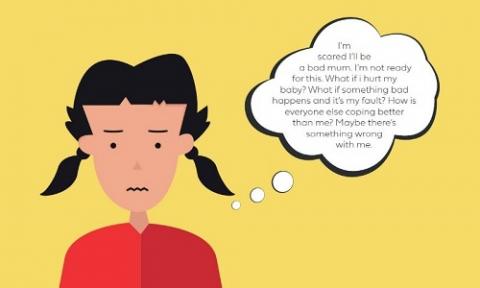OU Academics Develop Website to Support Perinatal Anxiety

Over the last few years, Psychologists Dr Gini Harrison and Dr Donna Moore have been working together to better understand and support women’s experiences of perinatal anxiety.
We all know that having a baby can be an exciting time, but for many it is also experienced as stressful and overwhelming. Indeed, research suggests around 20% women may experience significant levels of anxiety in the perinatal period (i.e. during pregnancy and through the first year following birth). While some degree of anxiety is normal at this time, some people have symptoms that are difficult to control, that they find distressing or intense, or that significantly interfere with their day-to-day lives.
Unfortunately less than 50% of women experiencing perinatal anxiety will seek help or be identified as needing treatment; and of those who are identified, few will receive efficacious treatment. This is likely to be due (at least in part) to a lack of awareness of perinatal anxiety at both a public and healthcare professional level; meaning that symptoms often go unrecognised. For those who do recognise their symptoms; reduced flexibility and stigma (e.g. concerns about being regarded as a ‘bad mother’) may mean women are reluctant to seek help.
An online solution
The internet may be a valuable source of support for women experiencing perinatal anxiety. ‘eHealth’ tools can be effective, low cost, available 24/7 and offer a level of anonymity that might help to overcome the stigma sometimes attached to seeking help. However, a review of websites that provide information and support for perinatal anxiety (conducted by researchers at the OU) found that resources were often inaccurate, confusing and incomplete, frequently confusing perinatal anxiety for depression. While postnatal depression and perinatal anxiety can go hand-in-hand, often they don’t. This means that women experiencing anxiety without depression many not relate to symptoms outlined on these sites, meaning they are unlikely to recognise the problem or seek help.
To address this issue (and with the help of some perinatal women who we interviewed about their experiences with anxiety), we have now developed an open-access website designed to provide evidence-based information explicitly about perinatal anxiety. So if you want to find out more about perinatal anxiety, you can find information, screening tools, and evidence-based self-help guides at www.openPAWS.co.uk
Dr Harrison has also written an article about this subject for The Conversation.
Request your prospectus
![]()
Explore our qualifications and courses by requesting one of our prospectuses today.